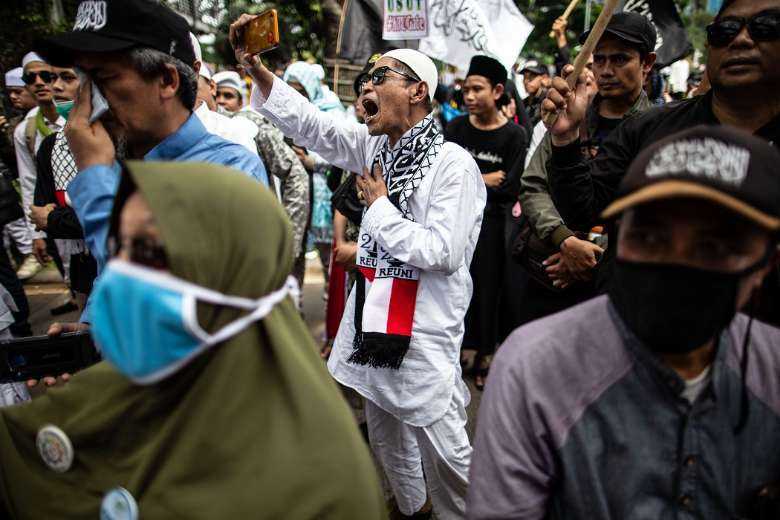
Hundreds of Indonesian Muslims rally in Jakarta on Feb. 21, 2020, to commemorate mass rallies in 2016 and 2017 against former Jakarta governor Basuki Tjahaja Purnama, who was later jailed in a blasphemy case. (Photo: AFP)
In monotheistic religions, it’s common for blasphemy, the act of insulting or showing contempt to a deity or sacred object, to be looked upon as a serious crime and punishable.
This view gave birth to anti-blasphemy laws to ensure people’s faith in God and devotion to sacred objects are safeguarded from attacks. One such ban appears in the Ten Commandments of the Old Testament.
In many countries, mostly Muslim-majority ones, such laws have created a magnitude of problems as they have become an effective weapon in the hands of the powerful majority to restrict minority groups from exercising their faith or to bridle freedom of expression.
The US Commission on International Religious Freedom (USCIRF) in its 2020 annual report named many Asian nations, including India, Pakistan, China and Myanmar, as countries of “particular concern” because of serious religious freedom violations.
According to International Christian Concern, false blasphemy accusations in Pakistan are used to incite religious hatred against Christians.
One of the most high-profile cases was Asia Bibi, a Christian woman who spent years on death row after being convicted of blasphemy in 2010 following an argument with a group of Muslim women. A court acquitted her of all charges eight years later but she was forced to flee to Canada as her life was still considered in danger.
The laws are not only exploited to persecute Christians and other religious minorities but also to settle rivalries, including against other Muslim groups such as the Ahmadiyya and Shia
The USCIRF placed Indonesia on a “special watch list” because its government allows or engages in severe religious freedom violations. Bowing to public pressure following blasphemy accusations has contributed to this listing.
Indonesia and Pakistan have something in common with regards to anti-blasphemy laws. The laws are not only exploited to persecute Christians and other religious minorities but also to settle rivalries, including against other Muslim groups such as the Ahmadiyya and Shia.
The blasphemy ban in Indonesia is regulated by the 1965 Prevention of Religious Blasphemy Law, supported by Articles 156 and 157 of the Criminal Code.
Article 156 guarantees the rights of Indonesian people of different races, origins, religions, nationalities or positions. Meanwhile, Paragraph 1 of Article 157 relates to criminal charges on a person who broadcasts, displays or publicly posts writings or paintings containing statements of hostility, hatred or humiliation against other people or religious groups.
The electronic transaction law sets a punishment of up to six years in prison for those who post blasphemous content via the internet against any of the country’s official religions — Islam, Protestantism, Catholicism, Hinduism, Buddhism and Confucianism.
According to Andreas Harsono, an Indonesia researcher for Human Rights Watch, more than 150 Indonesians, mostly from religious minorities, have been convicted of blasphemy since the blasphemy law's introduction in 1965.
Muhammad Kece, a Christian who converted from Islam, and Muslim cleric Yahya Waloni could become the latest victims following their arrest in August. Kece, who was later assaulted while in detention, allegedly insulted the Prophet Muhammad, while Waloni allegedly declared the Christian Bible as fake.
Every time a blasphemy charge is laid, calls for a revision of the law usually follow.
Many calls came in 2016 after a Muslim mob damaged several Buddhist temples in retaliation against a Buddhist woman in North Sumatra who was accused of blasphemy for complaining about loud calls to prayer from a nearby mosque.
A similar incident occurred in May near Jakarta when an angry mob attacked and burned the house of a man who complained about the loudspeakers at a nearby mosque.
Moves to revise, or even abolish, the law have been filed by critics who say it is haphazardly used for political purposes to target groups such as Shia Muslims, Ahmadis or Christians.
A case in point was when Basuki Tjahaja Purnama, the former Jakarta governor, was accused of blasphemy and sentenced to two years in prison in 2017.
However, the majority, including those in power claim the law, in its present form, maintains interreligious harmony.
A multi-religious country such as Indonesia must maintain interfaith harmony. But imposing a law that has often been abused is questionable
The Constitutional Court said the anti-blasphemy law helps Indonesia uphold freedom of religion.
According to the court, punishing blasphemy is necessary because insulting a religion cannot be justified. The court said no person or institution has the right to harass or treat other religious elements maliciously as it could trigger anger and public unrest.
A multi-religious country such as Indonesia must maintain interfaith harmony. But imposing a law that has often been abused is questionable.
Ideally, a blasphemy law should function like traffic lights that prevent cars from bumping into each other. It works when it protects believers from attacks by fundamentalists who claim that their religious point of view is better than others.
But it fails when it is used as a weapon to oppress minority groups as happened to members of Indonesia’s Ahmadi community in early September.
The Ahmadi form of Islam is considered blasphemous by mainstream Muslims as it believes Muhammad was not the last prophet.
An Ahmadi mosque in Sintang, West Kalimantan, was burned by a group of people who did not want their presence in the area. Back in 2011, three Ahmadis were killed when around 1,000 people attacked their home in Cikeusik in Banten province.
While revision, let alone abolition, of the anti-blasphemy law remains highly unlikely, all in society — particularly the government and law enforcement — must ensure it is used in the way it was intended and not exploited by those with their own agendas.
The views expressed in this article are those of the author and do not necessarily reflect the official editorial position of UCA News.


